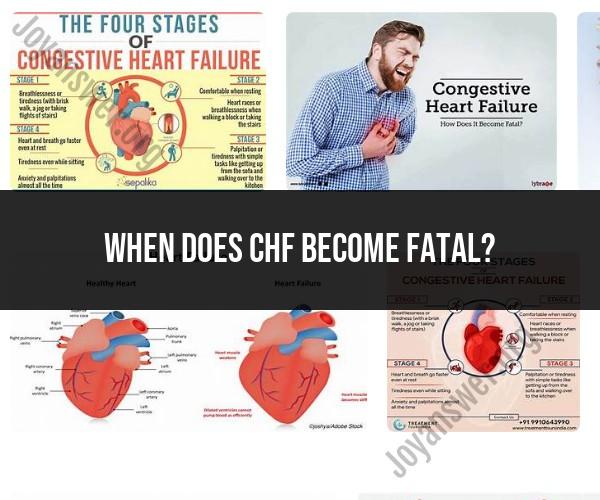When does CHF become fatal?
Congestive Heart Failure (CHF) is a serious medical condition, and its severity can vary from person to person. Whether or when CHF becomes fatal depends on several factors, including the underlying cause, the individual's overall health, the management of the condition, and access to medical care. Here are some considerations:
Underlying Cause: The underlying cause of CHF plays a significant role in its severity and potential fatality. CHF can be caused by various factors, including coronary artery disease, hypertension, heart valve disorders, or cardiomyopathy. The specific cause may influence the prognosis.
Stage and Severity: CHF is often classified into stages ranging from Stage I (mild) to Stage IV (severe). The progression to advanced stages of CHF can increase the risk of fatality. In severe cases, the heart's ability to pump blood is significantly compromised, which can lead to life-threatening complications.
Effective Management: Early diagnosis and effective management of CHF can help improve quality of life and increase life expectancy. Medications, lifestyle changes, and medical interventions (such as cardiac devices or transplantation) can slow the progression of CHF and reduce the risk of fatality.
Comorbid Conditions: The presence of other health conditions, such as diabetes, kidney disease, or lung disease, can complicate CHF and increase the risk of adverse outcomes. Managing these comorbid conditions is crucial in reducing fatality risk.
Medical Care: Access to medical care and the expertise of healthcare providers are essential. Timely medical interventions, regular monitoring, and follow-up care can make a significant difference in the management of CHF.
Patient Compliance: Patient compliance with prescribed medications, dietary restrictions, exercise regimens, and lifestyle changes is critical. Non-compliance can lead to disease progression and increased fatality risk.
Support System: Social and emotional support from family and caregivers can play a role in a patient's overall well-being. It can positively impact mental health, adherence to medical recommendations, and the management of CHF.
It's important to note that CHF is a chronic condition, and with proper management, many individuals can live fulfilling lives for years. However, in advanced stages or when not effectively managed, CHF can become fatal. Symptoms of worsening CHF that may indicate a need for urgent medical attention include severe shortness of breath, chest pain, extreme fatigue, and confusion. If you or someone you know is experiencing these symptoms, it's crucial to seek immediate medical help.
The prognosis for CHF varies from person to person, so it's important for individuals with CHF to work closely with their healthcare providers to develop a personalized treatment plan and receive regular medical evaluations. Early intervention and comprehensive care can significantly improve outcomes and reduce the risk of fatality.
The Progression of Congestive Heart Failure (CHF)
Congestive heart failure (CHF) is a chronic condition in which the heart muscle is weakened or damaged and cannot pump blood efficiently throughout the body. This can lead to a buildup of fluid in the lungs, abdomen, and ankles.
CHF can progress over time, and the severity of the condition can vary from person to person. In some cases, CHF may remain stable for many years, while in other cases it may progress rapidly.
When Does CHF Become a Life-Threatening Condition?
CHF can become a life-threatening condition when the heart is so weakened that it cannot pump enough blood to meet the body's needs. This can lead to a number of complications, including:
- Heart failure: This is the most serious complication of CHF and it occurs when the heart muscle is so weak that it cannot pump blood efficiently at all.
- Arrhythmia: This is a condition in which the heart beats too fast, too slow, or irregularly.
- Cardiogenic shock: This is a life-threatening condition in which the heart cannot pump enough blood to meet the body's needs and blood pressure drops dangerously low.
Signs and Symptoms of CHF Progressing to Fatal Stages
The following signs and symptoms may indicate that CHF is progressing to a fatal stage:
- Shortness of breath at rest or with minimal exertion
- Severe fatigue
- Swelling in the feet, ankles, and abdomen
- Rapid weight gain
- Difficulty sleeping
- Bluish discoloration of the lips and fingers
- Confusion
- Dizziness or fainting
If you experience any of these symptoms, it is important to seek medical attention immediately.
Medical Interventions for Late-Stage CHF
There are a number of medical interventions that can be used to treat late-stage CHF. These include:
- Medications: A variety of medications can be used to help improve heart function, reduce fluid retention, and control blood pressure.
- Surgery: In some cases, surgery may be necessary to improve heart function or to replace damaged heart valves.
- Mechanical devices: Mechanical devices, such as ventricular assist devices (VADs) and left ventricular assist devices (LVADs), can be used to help the heart pump blood more efficiently.
- Heart transplant: In some cases, a heart transplant may be the only option for patients with late-stage CHF.
Palliative Care and Quality of Life in Advanced CHF
Palliative care is a type of care that focuses on relieving the symptoms of a serious illness and improving the quality of life for the patient and their family. Palliative care can be provided at any stage of a disease, and it is often used in conjunction with other medical treatments.
Palliative care for patients with advanced CHF may include:
- Pain management
- Controlling shortness of breath
- Managing fluid retention
- Providing emotional support for the patient and their family
The goal of palliative care is to help patients with advanced CHF live as comfortably as possible and to enjoy the highest possible quality of life.
If you or a loved one has been diagnosed with CHF, it is important to work with your doctor to develop a treatment plan that is right for you. This plan may include medical interventions, palliative care, or a combination of both.












